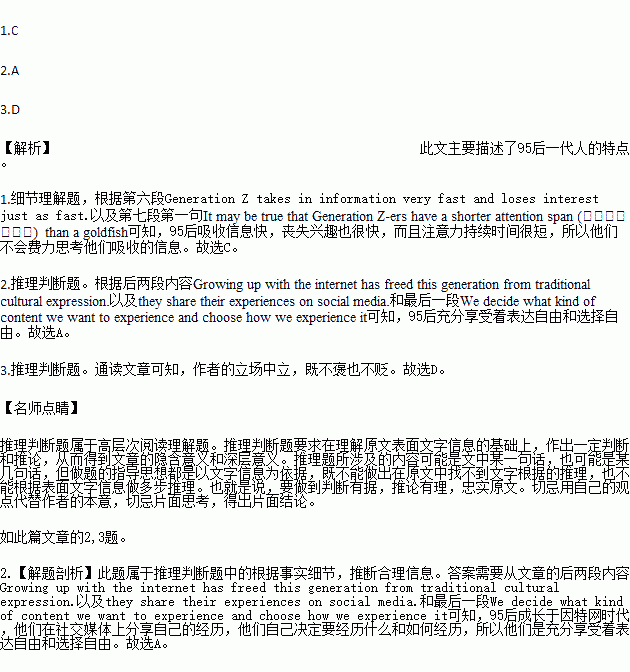题目内容
Forget about the “post-1995 generation”. Young people born in 1995 or later have another name in English—Generation Z.
Now entering adulthood and soon to join the workforce, Generation Z grew up in a special period of time—a time in which technology developed fast, social changes happened every day, the internet became universal and, sadly, so did global terrorism.
It is believed that Generation Z is the generation that is going to shape our future, which is why policy makers, sociologists and company leaders are trying their best to understand these young people.
So, what are Gen Z-ers really like?
Most people agree that the single biggest difference between Gen Z and other generations is how connected they are. This is a group of people who have been familiar with social media as soon as they were born. Social media has changed the way Gen Z-ers communicate with each other and how they get and understand information.
“We are the first true digital natives. I can almost create a document, edit it, post a photo on Instagram and talk on the phone, all at the same time,” said Hannah Payne, an 18-year-old student at UCLA, according to The New York Times. “Generation Z takes in information very fast and loses interest just as fast.”
It may be true that Generation Z-ers have a shorter attention span (注意力持续时间) than a goldfish, but since they grew up among social changes, they are more active in politics. According to the British Election Study, 58 percent of 18-to-24-year-old voted in the 2015 general election in the UK, a big jump from 38 percent in 2005.
Generation Z-ers are also culture creators. “Growing up with the internet has freed this generation from traditional cultural expression.” Wrote Grace Masback, a Huffington Post blogger and a Gen Z-er herself. According to Masback, these young people are no longer willing to let their creativity be limited by their parents of traditional rules. They watch videos and read news online instead of on TV, and they share their experiences on social media.
“We decide what kind of content we want to experience and choose how we experience it,” wrote Masback.
1.Which is TRUE about Gen Z-ers, according to the article?
A. Face-to-face communication is challenging for them.
B. Often doing many things at the same time affects their efficiency.
C. They don’t bother to think about the information they take in carefully.
D. They show more interest in politics than in other fields.
2.What can we infer from the last two paragraphs?
A. Gen Z-ers enjoy great freedom to express themselves.
B. Gen Z-ers enjoy teaching their parents about new cultural trends.
C. Gen Z-ers are against traditional culture.
D. Gen Z-ers are unwilling to obey their parents.
3.Which word can best describe the author’s attitude towards Generation Z?
A. Worried B. Critical C. Appreciative D. Neutral(中立的)

